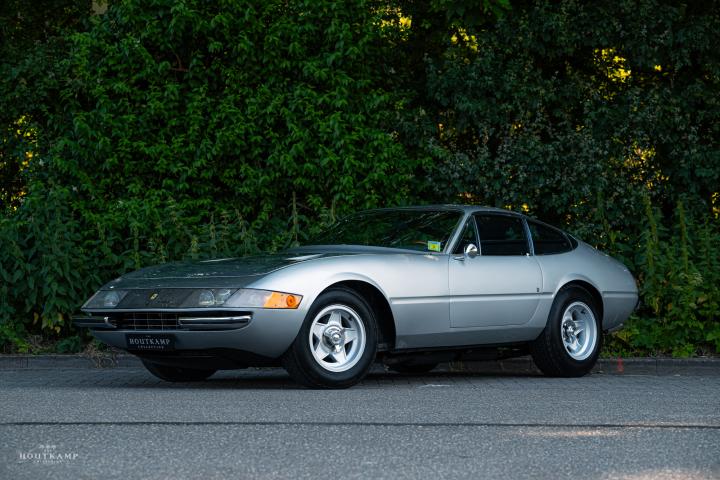Among the most collectible Ferrari road cars ever produced
Exceptional early-European example originally fitted with the desirable Plexiglas nose, as opposed to the later front-end treatment with retractable headlamps
The 12th regular production Daytona built
Finished in its original colour combination of Argento Metallizzato over Nero leather interior
Nicknamed “Daytona” in tribute to the American 24-hour endurance race, in which Ferrari achieved a storied 1-2-3 finish
Modern bodywork designed by Pininfarina and built by Scaglietti
Highly Original Example
Documented history by Ferrari historian Marcel Massini
Complete with the Ferrari Classiche Certificate of Authenticity and full ‘Red Book’ issued in 2021
4,390 CC Tipo 251 DOHC V-12 Engine
Just 1,284 Berlinetta models and 121 Spider convertibles had been made when production ceased in 1973
One of approximately 411 examples early cars originally with a plexiglass headlight arrangement
At the time of its introduction in 1968 the Daytona was the most expensive production Ferrari ever and, with a top speed in excess of 170mph, was also the world’s fastest production car.
“It’s a hard muscled thoroughbred, the Daytona – easily the most awesome and yet disciplined road-going Ferrari in that firm’s brilliant quarter century of existence. The Daytona isn’t fast – it’s blinding. It will eat up a quarter-mile of asphalt in 13.2 seconds at 110mph and scream out to 175mph – or it will slug through traffic at 1,500rpm with the Sunday manners of a FIAT. It is the perfect extension of its driver. You can cut and weave through shuffling traffic with the agility of a halfback, or lope down the freeway with the piece of mind that comes from knowing you can contend with anyone’s incompetence. To say, after you’ve driven it, that the Daytona is desirable doesn’t begin to sum up your feelings – you would sell your soul for it.” – Car & Driver, January 1970.
The 365 GTB/4 Berlinetta was announced at the Paris Salon in October 1968 and featured brand-new coachwork penned by Pininfarina designer Leonardo Fioravanti, later the famed carrozzeria’s Director of Research and Development.
Mr. Fioravanti once revealed that the Daytona was his favorite among the many Ferraris he designed.
The shark-nose styling was a significant departure from prior models that was never to be repeated, making the model one of the most unique in Maranello’s entire production history.
As Ferrari had recently swept the competition with a 1-2-3 finish at the 1967 24 Hours of Daytona, the new road car was nicknamed the Daytona, although this name was never officially endorsed by the factory.
Although the prototype had been styled and built by Pininfarina in Turin, manufacture of the production version was entrusted to Ferrari’s subsidiary Scaglietti in Modena.
At the time of its introduction in 1968 the Daytona was the most expensive production Ferrari ever and, with a top speed in excess of 170mph, was also the world’s fastest production car.
Just 1,284 Berlinetta models and 121 Spider convertibles had been made when production ceased in 1973. This is one of the early cars originally with a plexiglass headlight arrangement, 1 of approximately 411 examples.
In 1971 the plexiglass strip design was changed and the Daytona got the infamous pair of retractable headlights. This was done due to changes in US legislation. The renewed legislation did not allow for headlights behind covers. After trying to fix the problem with certain alternatives of fixed open headlights, Ferrari ultimately decided for the retractable headlights which did not disturb the design of the Daytona.
ABOUT THIS SPECIFIC EXAMPLE
A European-specification car, this specific example was completed on 14 May 1969 and was the 12th regular production car built.
It left the factory finished in a timeless Argento Metallizzato (Silver) exterior paint paired with Nero seats, other vinyl trim, and the correct fluted beige headliner.
As one of the early cars, the Silver paint was accented by a Perspex nose panel, featuring Perspex-covered headlamps as opposed to the later front-end treatment with retractable headlamps.
One of approximately 411 examples have this desirable plexiglass headlight arrangement.
This specific example was delivered new to the official dealer Parauto Snc in Genova, Italy, in September 1969.
It was acquired by its first private owner Mr. Colombo Bianchi, resident in Taggia (Imperia).
Mr. Bianchi sold the car in 1972 to its next owner in Switzerland, Mrs. Dorothea Erhardt.
Mrs. Erhardt would sell the car after three years to its third owner, this time in Milan, Mr. Giorgio Camerano.
Around 1977, the car was exported to the East Coast of the US where it was purchased by Gary Kaiser in Florida. Shortly thereafter the car passed to noted collector Dr. Ron Finger in Savannah, Georgia before passing in 1978 to Dr. Jerry Winston in Tennessee.
In December of 1982 North Carolina dealer Foreign Cars Italia sold the car to Robert Warren in Raleigh, North Carolina who proceeded to carefully preserve the car in storage for the next 30 years.
Subsequently the car went back to Europe and was purchased by Mr. Brandon Wang who also owns a Ferrari 250 GTO.
In May 2021 the Daytona received its Ferrari Heritage Certificate, attesting to the originality of its numbers matching pieces.
In 2022, a meticulous full service was carried out at Prestige Selections in Titisee, Germany for invoices over 32.000,- €.
The car is complete with original books and leather pouch.
CONDITION EXTERIOR
The cosmetics of this Daytona are today best to describe as period correct with a nice patina. A condition we personally like very much.
This car is not an over-restored example but shows it’s age. The Daytona can be seen as an unmolested original car with mainly original details. This means that the car is not a trailer queen but a car which shows it’s emotion.
On the paint one can find signs of use and some wearing.
The Plexiglas front is fully original even as the windows and the chrome and aluminum parts.
The Daytona is in a very nice, but not freshly restored condition.
The wheels are in as new condition without any damages or signs of use.
CONDITION INTERIOR
The cabin features one of Ferrari’s most gorgeous interior designs.
The original interior, in exceptional condition, has been retained.
The car’s interior is impressive, with high-quality Italian leather combined with cloth seats, a wood-rimmed steering wheel, and classic analog gauges.
The interior shows very minor signs of use.
It has a superb light patina and in our opinion it has to be kept and never renewed.
The carpet don’t show any large signs of use and the steering wheel and switches/buttons are don’t show any marks of significance.
All switches, meters and gauges are in a perfect working condition.
DRIVING EXPERIENCE
During a recent test drive, the Ferrari offered a thrilling ride with plenty of power and a symphony of aural pleasure booming out of the quartet of exhaust pipes.
Driving the Ferrari is a unique experience. The engine is extremely powerful and gives a very impressive mechanical sound.
The handling is excellent, actually what you expect from a Ferrari. The steering is very direct even as braking etc.
The gearbox is shifting very nicely without any synchromesh noises.
Yes it’s a big party to see and drive this Ferrari.
With full ‘Red Book’ Ferrari Classiche certification on file, and still benefiting from the full service by a well-regarded marque specialist in Germany in 2022, this would make a striking addition to any collection.
Nearly every Ferrari is collectible to some extent, but for an iconic model such as the Daytona, the allure is much higher.
If a Daytona was ever something on your wish list, this wonderful example surely deserves a good look.




